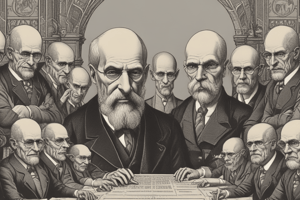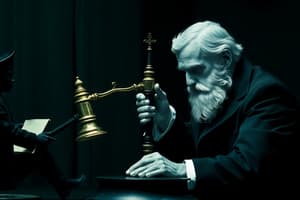Podcast
Questions and Answers
What was Durkheim's goal for establishing sociology?
What was Durkheim's goal for establishing sociology?
- To create a new social movement
- To criticize the current social structure
- To establish sociology as a science (correct)
- To study sociology as a form of art
What did Durkheim compare society to?
What did Durkheim compare society to?
- A natural disaster
- A machine
- A living organism (correct)
- A computer program
What term did Durkheim use to describe social cohesion based on cooperation and consensus on values and customs?
What term did Durkheim use to describe social cohesion based on cooperation and consensus on values and customs?
- Anomie
- Mechanical solidarity
- Social constraint
- Organic solidarity (correct)
According to Durkheim, what is the result of rapid social change and a breakdown of traditional moral standards?
According to Durkheim, what is the result of rapid social change and a breakdown of traditional moral standards?
What aspect of societal evolution did Durkheim note as key?
What aspect of societal evolution did Durkheim note as key?
What did Durkheim's study of suicide demonstrate?
What did Durkheim's study of suicide demonstrate?
What did Durkheim advocate for when studying social facts?
What did Durkheim advocate for when studying social facts?
What did Durkheim view as exerting constraints over individual actions?
What did Durkheim view as exerting constraints over individual actions?
According to Durkheim, what is anomie?
According to Durkheim, what is anomie?
What is the main focus of Marx's Materialist Conception of History?
What is the main focus of Marx's Materialist Conception of History?
What is the main characteristic of capitalism according to Marx?
What is the main characteristic of capitalism according to Marx?
What is the predicted future vision of Marx beyond capitalism?
What is the predicted future vision of Marx beyond capitalism?
What is the inherent class conflict in capitalism according to Marx?
What is the inherent class conflict in capitalism according to Marx?
What is the contrast between Marx and Durkheim?
What is the contrast between Marx and Durkheim?
What is the name of Karl Marx's theory?
What is the name of Karl Marx's theory?
Where did Karl Marx live in exile?
Where did Karl Marx live in exile?
What did Durkheim observe in suicide rates?
What did Durkheim observe in suicide rates?
What is the main focus of Durkheim's book 'The Elementary Forms of Religious Life'?
What is the main focus of Durkheim's book 'The Elementary Forms of Religious Life'?
What characterizes the 'Sacred' in Durkheim's theory?
What characterizes the 'Sacred' in Durkheim's theory?
What is the primary function of the 'Sacred' in society?
What is the primary function of the 'Sacred' in society?
What is 'Collective Effervescence'?
What is 'Collective Effervescence'?
What is the primary context in which Collective Effervescence occurs?
What is the primary context in which Collective Effervescence occurs?
What is the main purpose of the exercise 'Durkheim's Vision of the Social'?
What is the main purpose of the exercise 'Durkheim's Vision of the Social'?
What is the key concept that distinguishes the 'Sacred' from the 'Profane'?
What is the key concept that distinguishes the 'Sacred' from the 'Profane'?
Flashcards are hidden until you start studying
Study Notes
Emile Durkheim
- Advocated for establishing sociology as a science, emphasizing methodological principles for research
- Introduced the concept of social facts, which are aspects of social life that influence individual actions, such as the economy or religion
- Advocated for studying social facts as "things," treating social life with the same rigor as natural objects
Organic Solidarity & Social Constraint
- Compared society to a living organism with specialized parts (institutions) that contribute to the whole
- Introduced the term "organic solidarity," denoting social cohesion based on cooperation and consensus on values and customs
- Argued that societies exert constraints over individual actions, viewing social structure as external and constraining
Division of Labor and Anomie
- Noted the division of labor as a key aspect of societal evolution, with increasing specialization and interdependence
- Described anomie as a state where social norms lose their hold on individual behavior, linked to rapid social change and a breakdown of traditional moral standards
Suicide
- Studied suicide, demonstrating how social factors influence suicidal behavior, rather than just personal ones
- Observed consistent patterns in suicide rates, explaining them sociologically
Profane vs. Sacred
- Distinguished between the sacred and the profane, with the sacred encompassing elements of life set apart, revered, and considered awe-inspiring or transcendent
- The profane relates to ordinary, mundane aspects of life, lacking reverence or special status
Collective Effervescence
- Introduced the concept of collective effervescence, referring to the intense energy, excitement, and shared sense of unity experienced by individuals in a group during rituals or communal events
- Highlighted the importance of shared emotional experiences in maintaining and renewing social cohesion
Karl Marx
Materialist Conception of History
- Focused on social changes during the Industrial Revolution, contrasting with Durkheim's emphasis on morality and culture
- Viewed history as a series of class struggles, especially between the rich and the poor
Capitalism and Its Future
- Defined capitalism as a system with private ownership of wealth and means of production, creating a class dichotomy between the ruling class and the working class
- Predicted the replacement of capitalism by a more egalitarian society, envisioning communal ownership to reduce class divisions
Studying That Suits You
Use AI to generate personalized quizzes and flashcards to suit your learning preferences.




